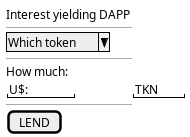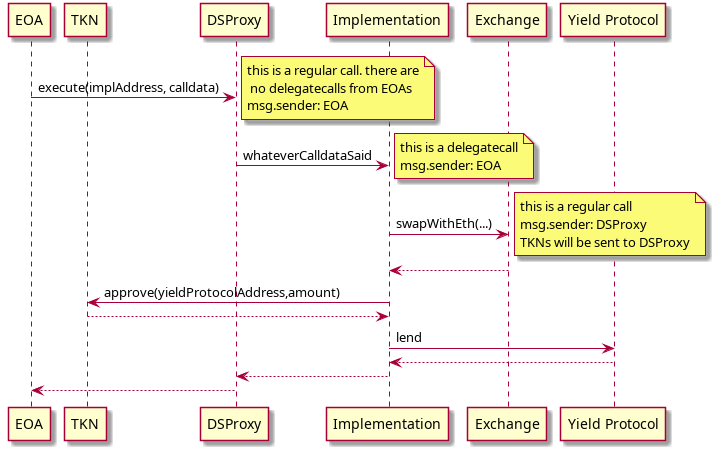So you want to use DSProxy
But why?
Let's say you're making a dapp for a protocol where you can deposit your tokens and receive interest on them.
Let's say that you also want that dapp to also swap that token from ETH, so the user goes into the dapp with ETH and with Just One Click, ends up with exposure to whatever the cool kids are pumping this week.
For the user, you want to provide the most streamlined experience possible:

But behind the scenes, you have (actors):
- an exchange, to swap ETH for TKN
- the interest yielding protocol
- the actual token a user wants to hold
and interactions:
- swap the eth for the token
- allow the token to the interest yielding protocol
- lock the token into ^
Each interaction means the user having to sign a transaction with the wallet of their choosing, and keeping track in the dapp of the intermediate states (If a user already swapped eth and reloads the page, you wouldn't make them start from the beggining, right?)
So, if you want to do all that with just one button, how do you achieve it?
Introducing DSProxy
DSProxy is a contract template deployed for every user which enables them to do several contract calls in a single transaction
It's controlled by the user, and it's meant to 'represent' them in some capacity (eg: hold their token balances)
It has little functionality on its own, and instead delegates it to separate implementation contracts
How it works
Following the aforementioned example, you'd need:
- The user having their own DSProxy contract. For now we'll assume they already have one.
- An actual implementation contract which defines what calls will the proxy will actually make

But the user's address wouldn't ever hold TKNs!
...or the tokens that lend would create, if any. That's correct. Ideally the dapp should know to use the tokens held by the user's DSProxy, and enable the user to move the tokens from there to their actual wallet.
But why not make a delegateCall to Exchange, Token or Yield Protocol?
That looks tempting, so msg.sender would be the EOA and tokens would be minted to the user directly, right?
It's correct that msg.sender would be the EOA, but calling the different protocol contracts (eg, the Exchange) most certainly wouldn't do what you expect.
When calling for example the TKN token, you want to use that contract's storage in the call and modify it, since that's where the balances are actually stored. Running an ERC20's contract code on a DSProxy storage is almost C-style undefined behaviour.
How do I know the DSProxy does a delegateCall to the implementation?
First: the code , but also, the existence of the DSCache, a contract that skips deployment of an implementation contract if the same bytecode was already deployed in the past, shows that the implementation's contract storage is not used.
Further reading
- DSProxy code: https://github.com/dapphub/ds-proxy
- Solidity's delegateCall documentation (overview): https://docs.soliditylang.org/en/v0.8.4/introduction-to-smart-contracts.html?highlight=delegatecall#delegatecall-callcode-and-libraries
- docs for Solidity's inline assembly directive for delegateCall https://docs.soliditylang.org/en/v0.8.4/yul.html#yul-call-return-area
- The Ethereum yellow paper in page 30 specs the delegatecall opcode. I understood like 5% of it.
Notes
- DSProxy is not the only way to achieve this, another example is Gnosis Contract Proxy Kit
- I haven't written an actual POC on this, so if it reads like I'm talking out of my ass, it's because that's the case.